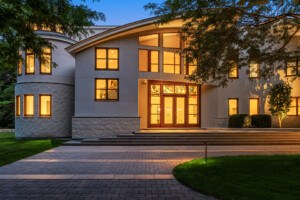Not in Newton’s Back Yard: Affordable Housing in Newton
Ten days later, at the second community meeting, the noise level and number of attendees more than doubled. Neither Metro West nor Pine Street was invited. The city’s community engagement officer and members of the Newton planning department hoped to turn the tide by educating residents about the process for administering the federal affordable housing funds and the availability of nearby supportive services. The angry crowd never gave them a chance. One of the more vocal opponents, Waban resident Gary Jacobson, a psychiatrist who works with the chronically homeless, made his points by standing on a chair. Later, he circulated a letter to his neighbors, stating that the placement of long-term homeless residents at Engine 6 would constitute a “clear and present public endangerment of our neighborhood.” Given his experience with the homeless, Jacobson added, he did not have a lot of hope for their rehabilitation.
With that kind of an opening, people felt free to let it rip. “We live in a community where our kids walk to school…or to get ice cream… I want to know why we shouldn’t be worried about our kids walking on their own through the community” if the housing proposal is approved, Waban resident Jill Balmuth was quoted saying in the Globe. The tenants, she added—to a round of applause—“are not gonna be accepted in this community. So I’m not sure it’s not fair on either side.” Waban resident Leonard Sherman, also quoted in the Globe, said, “They really would be better served being in an area such as, I hate to say this, but in Waltham.”
After this second disastrous meeting, Pine Street Inn agreed to exclude anyone who had been convicted of a sexual offense, murder, or manslaughter. But it was already too late: Unbeknownst to the developers, the project was doomed.
I’ve lived in Waban for 16 years; my husband and I are raising our two sons here. And when I first heard about the city’s plan for Engine 6, I remember thinking how incongruous it felt. Homeless people living in Waban? It just seemed weird. Like everyone else, I wanted to protect my lucky little corner of the world. But I wasn’t sure if that meant the proposal should be stopped. Up to that point, I had never given much thought to affordable housing. I think a lot of people were unsure of what to do. But very quickly, the town’s supporters and opponents began to organize into separate camps—and that meant choosing sides.
Kathleen Hobson and her Waban neighbor, an elder-rights lawyer named Liz Baum, put together a group called “Supporters of Engine 6,” which eventually grew to more than 265 people. On the other side of the divide was the “Committee of Concerned Neighbors,” a collection of seven residents, including lawyers, marketing experts, and a veterinarian, who lived within a mile of the firehouse and banded together to fight the project. Together, they sent around an email—forwarded many times—laying out their fears. The verbiage veered awkwardly into legalese: “To be clear, our concern about placing the chronically homeless in the Engine 6 Firehouse derives not from the status of being chronically homeless, but rather from the behavior reasonably to be feared over time from the chronically homeless combined with the vulnerability of the surrounding environment to that threat.” I wanted to ask them more about their opposition, but, perhaps unsurprisingly, no one from this group saw any upside to going on the record.
Other opponents of the Engine 6 project came in a colorful assortment of flavors. There was the crowd that was concerned about safety, as well as the ones who were worried about money. Property values, they protested, would surely fall if the project was allowed to go through. Still others blamed the location itself, claiming the city’s tree-lined streets would not meet the needs of the homeless. Several said they were all for supporting the homeless, just not here. All of it was classic NIMBY: great program, great idea, but Not in My Back Yard.
As the debate raged on, Waban’s premier gathering spot—the Starbucks on Woodward Street—became the site of tense encounters. Many people didn’t necessarily know where their friends and neighbors stood, so an offhand comment could lead to an awkward moment. In at least one case, the project began to tear households apart.
One of my best friends in Waban found herself on the opposite side of her husband, one of the seven original “concerned neighbors.” She said she stayed upstairs and fumed while the group met in her living room. Others, like me, kept quiet in public for fear of getting into a dispute. “I had friends who had a really difficult time with each other, good friends, who were at polar extremes, and it took a while for them to come back together,” says Waban mom Kathy Winters. “It’s still a sore subject.”
No one in Waban had seen this kind of controversy in recent memory. The houses, large and eclectic, empty out during the summer and on winter weekends as couples and their children pile into luxury SUVs and head off to vacation homes. A good portion of the children attend private schools, and even the public school families are generous, raising more than $50,000 annually for each of the two elementary schools. People willingly give of their time and money.
When it comes to affordable housing, however, our generosity of spirit hasn’t added up. Like most wealthy suburbs, Newton doesn’t meet the 10 percent affordable-units threshold set out in Massachusetts law—which operates more as a goal than an actual requirement. The only penalty for noncompliance is that the state can subject the town to affordable-housing developments that override local zoning. Currently, only 7.5 percent of Newton’s housing stock falls into the state’s “affordable” guidelines, putting it between Wellesley, at 6.2 percent, and Brookline, at 8.1 percent. Waban, however, has only 24 affordable units, or just over one percent of its 2,005 households—not much of a contribution to Newton’s affordable-housing inventory.
At the same time, Massachusetts has the fastest-growing homeless population in the country, and the competition for affordable units throughout the state is fierce. Thanks to the closing of the shelter on Long Island in Boston last year, the situation is more desperate than ever. In November, for instance, 10,000 people in Boston applied for 73 vacant affordable-housing units.
Despite the long-standing need for affordable housing, several opponents of the Engine 6 project went so far as to run for the newly formed Waban Area Council, a nine-person board that represents village interests at City Hall. Several WAC members said they were determined never to be bushwhacked by an idea like this ever again. The group’s website even features a video unironically titled, “Not in My Back Yard.” Apparently, all it would take to turn the historical majesty of Waban into Chelsea was a shelter for nine homeless people. Today, the firehouse, tomorrow…well, what, exactly?
Just as the cacophony reached its fevered peak in June 2013, and neighbor began to turn on neighbor, Setti Warren, a former aide to John Kerry and the first popularly elected black mayor in Massachusetts, summarily shut down the project.
The move blindsided residents, coming one week before the close of the public-comment period. In one of the stranger acts of political doublespeak ever uttered in this city, Warren’s press release called for “further dialogue” while simultaneously cutting off that dialogue by canceling the third public meeting, which had been scheduled for two days later. By way of explanation, he wrote that he could not “at this time” allocate the necessary federal funding for the project.
Alderman Crossley spoke with Warren the night before he pulled the plug, urging him not to cut off the public process. “I told him, ‘You are taking people’s voices away,’” Crossley says. “‘There are people who have been doing their homework and waiting for their turn to speak. We need this third meeting.’” Warren told her that he would sleep on it, but released his decision the next day.
The uproar was immediate. Some praised Warren’s courage for doing the right thing. Others felt the mayor was bowing to pressure from Waban campaign supporters. Newton’s mayoral election was just a few months away, though no one expected the race to be hotly contested.
Throughout the summer of 2013, supporters tried to revive the proposal by persuading Warren to reopen the project-review process. In September, Supporters of Engine 6 invited the mayor to attend a presentation at the Eliot Church of Newton. Warren was a no-show, though hundreds of people turned out to hear presentations from Pine Street Inn head Lyndia Downie and two current residents of Pine Street’s 36 permanent homes in Boston and Brookline. Downie said that in the past year alone, Pine Street had received shelter and housing requests from 45 people who were born or had lived in Newton. Engine 6 potentially could have helped some of them. Paul Sullivan, who has lived in a Pine Street house in Boston for four years, said at the meeting he was the “luckiest former homeless person in the world.” The residents, he told them, are good neighbors. Downie agreed, saying, “Once you’ve been homeless, the opportunity to live in a place like where Engine 6 is is a dream.” By the end of the night, more than 250 Newton residents had signed a pro–Engine 6 petition.
The Boston Home team has curated a list of the best home design and home remodeling professionals in Boston, including architects, builders, kitchen and bath experts, lighting designers, and more. Get the help you need with FindIt/Boston's guide to home renovation pros.


